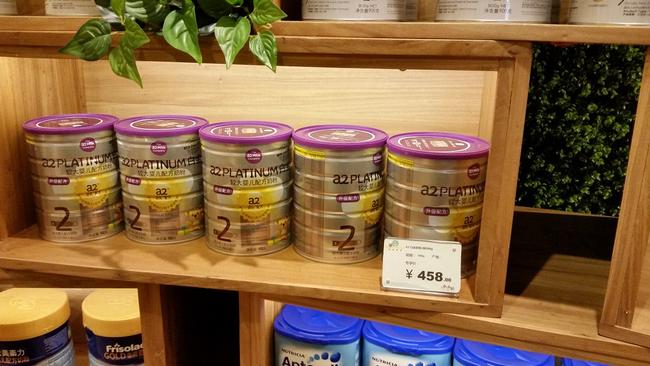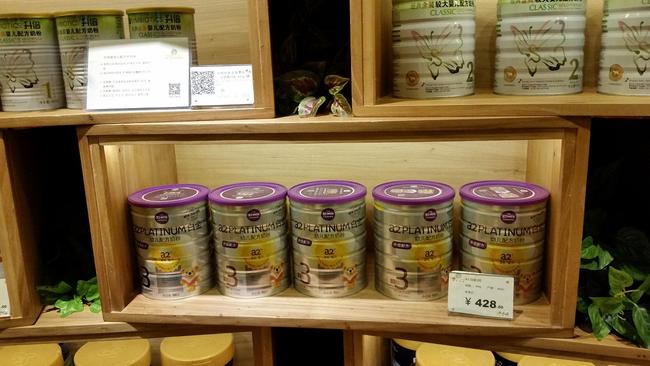Chinese stores charging ‘ridiculous prices’ for Australian baby formula, fuelling daigou trade
SCENES of shoppers frantically stripping baby formula from shelves have caused outrage — but are the “daigou” really to blame?

SCENES of shoppers frantically stripping baby formula from shelves for resale into China have caused outrage among some Aussie mums — but are the “daigou” really to blame?
The number of daigou, or personal shoppers, has exploded since 2014 to around 80,000, some of whom make upwards of $100,000 a year snapping up sought-after brands from shelves and selling them to Chinese customers via social media apps such as WeChat.
While brands such as A2, Aptamil and Bellamy’s have begun selling direct into China through physical retailers and e-commerce platforms such as Tmall, the diagou trade shows no signs of slowing — and these photos may explain why.
Snapped inside a baby and toddler store by Australian man Alex Lau on a recent visit to Shanghai, the photos show individual tins of A2 Platinum Stage 2 retailing for 458 yuan ($90) and A2 Platinum Stage 3 retailing for 428 yuan ($82), roughly three times the shelf price in Australia.

“To my utter horror they were selling them at prices even higher than those on TaoBao or private sites,” Mr Lau said. “Once I started taking photos in the store they were not happy.”
He argues that because the prices charged by Australian manufacturers in China are so high, buying through diagou is still cheaper for the country’s estimated 50 million consumers.
“These tins are export stock directly from A2 as you can see the label is in Chinese and not English,” he said. “If legitimate stores in China are buying their stock from A2 directly and other wholesalers who continually push the prices up to ridiculous levels, how can you not expect opportunists here to take advantage of that?”
After a video taken by a Brisbane woman of shoppers stripping Coles shelves of baby formula went viral earlier this week, Mr Lau said it was unfair that Chinese people were labelled “monsters” who buy up all the baby formula and “leave everybody else high and dry”.
“Local consumers are unaware that A2 and other companies are actually creating this mass shortage as they want to increase their profits exponentially overseas to the detriment of a class of people here who always finger the blame,” he said.
“People here in Australia [need to] know that the reason there is such a mad rush for baby formula is not because a few daigous can supply the entire Chinese market, [but] because they continue to charge ridiculous prices over there.”
a2 Milk could not confirm its wholesale pricing into China but pointed out that prices on the major Chinese e-commerce sites were significantly cheaper than in the photos.
“There is significant volatility in retail pricing in the China market,” said Peter Nathan, Asia Pacific chief executive of a2 Milk. “Consequently, the big online retailers [JD.com, VIP.com, Tmall, Kaola.com] are a better gauge of retail pricing in China.
“It is entirely incorrect to assume that all infant formula brands are targeted by daigou in Australia. Most are not and there are only a small number of SKUs that are targeted by daigou. A2 Platinum is a hot brand with significant consumer demand in China due to its unique proposition and therefore is in very strong demand.
“Consequently we will always ensure that local mums who need our brand can access it via our consumer hotline, as we have deliberately reserved stock for Australian domestic mums and will send it directly to their homes if they have trouble accessing our brand at retail level.”
A spokeswoman for Aptamil manufacturer Danone Nutricia said while a supplier may recommend retail pricing, the retailers themselves decide the selling price.
“This is the case in China too,” she said.
“Our Australian business doesn’t sell directly to retailers in China. As a global company, we have a well established business in China which distributes direct to Chinese retail customers. Some Chinese customers prefer to source product directly from Australia or Europe.
“We believe this is driven by product preference rather than price-related. As a result, we’re seeing unprecedented levels of demand for locally sold Aptamil, which means that some Australian families can find it difficult to locate products in their local store.
“We’re working hard to maintain supply and encouraging families to go to our online domestic mumstore.com.au where they can order Aptamil toddler and other Nutricia products, 24/7.
“We are also supplying record amounts of product to our local Australian retailer and wholesale customers, as a result of expanding our New Zealand operations.”
A spokesman for Bellamy’s said the company sold “to major Australian retailers and to a few selected distributors in Australia and China”. “Bellamy’s does not set or control retail prices, either online or offline, in either Australia or China,” he said.




